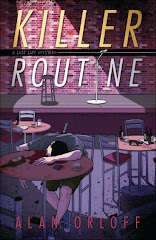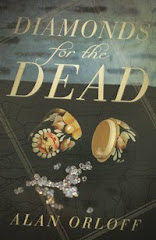
*****
You've had quite an eclectic career--from counsel to the Senate Intelligence Committee to horse handicapper to Silicon Valley entrepreneur. Now you're writing full-time. How different a writer would you be if you had started writing in earnest, say, twenty years ago?
There was a certain breathlessness to my life a couple of decades ago. As you note, I was skipping from career to career. I married, had four kids. Starting UpShot Corporation in 1996 meant 80 focused hours a week at the office with even more time spent when you count staring at the ceiling at 3 AM. There was no time to write in earnest.
UpShot was purchased by Siebel Systems in November 2003 and I left Oracle, the company that had swallowed Siebel, in February 2007. Almost right away I started work on SMASHER. I treated it like a job. Every day I went to a local café, drank gallons of green tea, and learned how to transport myself into the alternative universe of Ian Michaels and Rowena Goldberg. SMASHER couldn’t have been written without my experience as an entrepreneur.
Writing can be very isolating (very "in your own head"), while running a company is the opposite. How have you dealt with the change?
There’s less difference than you think. Both are team efforts. Just as I did in running a company, I’ve recruited a team to help me with my books, too. For example with SMASHER, I called on technical advisors like a neurosurgeon who made sure I got the details on comas right and a deputy DA who gave me insights into life as a female prosecutor. After finishing the manuscript, I turned it over to half a dozen readers who are analogous to the beta testers of the high-tech world. My agent, whose job it is to find a publisher and negotiate contracts, acted as my VP of sales. And a bunch of terrific writers like Steve Berry, M.J. Rose, Marcus Sakey, and Cara Black have been telling the world to read SMASHER. What they’re providing is what’s called trusted customer testimonials in the business world. Even in writing then, I have a team, a support network.
Do you outline or are you a "seat-of-the pantser"?
I heard Stephen King ask why – if you’re going to put all your creativity in your outline – shouldn’t you just sell the outline? For me the joy of writing is getting into the head of the protagonist and seeing and reacting to the world as he does. If I know what’s going to happen, it wouldn’t be fun. So I wouldn’t call myself a “seat-of-the pantser,” – more a “write-and-be-surprised-at-what-happenser.” I’m with Mr. King. That’s where the creativity is.
Say you've just finished the first draft of a novel. How do you go about revising? Where do you get feedback?
As I mentioned above, I have friends and family members who will read my first draft. By the time I’m done with that draft, I’ve lost all perspective. Their main role is to tell me if what I’ve written is a pile of shit or if redemption is a possibility. So far so good – they’ve always settled on the latter. Then I do a fresh edit and also incorporate their suggestions or at least all that make sense to me. For example, when I heard from a couple of them that SMASHER started a little slow, I rejiggered the story to move a car crash into the first chapter. Then comes the real editing. I send the manuscript to my agent who provides the kind of feedback editors at publishing houses would have a generation ago.
What's the best piece of writing advice you've gotten? The worst?
Someone along the way relayed James Thurber’s advice: “Don’t get it right, get it written.” Write without worrying about perfection, just get that first draft done! You can’t edit and polish something that’s not written. Okay, so that’s the best. What’s the worst? That you can’t write a good book unless it’s outlined first. I’m a live-and-let-live guy. If outlining works for you, great, but don’t tell me that your way is the only way.
Thanks, Keith - I can't wait to see what you have to say during Part II on Wednesday!
For more information about Keith and his books, visit his website and check out his blog, DOT DEAD DIARY.



















9 comments:
Great to see Keith on Blogging Monkeys! Nice interview.
I had no idea that Keith had such an interesting background. He's got a real wealth of info to draw from in his writing.
I'm with him on the outline thing--seems like too much planning to me. And Thurber's advice to great, too.
Elizabeth
Mystery Writing is Murder
Nice to see someone else can balance the craziness of life and writing. Thanks for this glimpse into another writer's balancing act. You and Elizabeth are always making Midnight Ink look good!
Michele
SouthernCityMysteries
Great interview! And such a pleasure to "meet" you Keith!
I especially appreciated your view on there not being much difference between your running a company and the apparent isolation of writing.
Although not a writer, I went from corporate and media environments to starting my own business. It really isn't that different. I have a routine, a "work day" if you will. Finding a balance, prioritizing, being organized and keeping it all in perspective is what works for me.
You have had such a diverse career. With me, what I'm doing now is something I've always loved and enjoyed doing. I often refer to positions I've held in the past as "just a job."
Is writing something you've always wanted to do - was it simply that the timing wasn't right, or that the opportunity to switch gears just hadn't presented itself before? What was the catalyst that took you from that diversity to where you are today?
Thanks for sharing your insights, Keith! I agree that you've got a fascinating background; it's always so nice to meet "the author behind the book."
Thanks for the comments, Elizabeth, Michele, and Margot. Crystal, I was a little bored at work so I signed up for a course at UC Berkeley Extension on writing a mystery. I got about 1/3 done and then decided to start a company. The manuscript for Dot Dead went into a drawer and didn't come out for 5 years. No, I didn't always plan to be a writer, but once I started focusing on it, I discovered I loved it.
I think it was Nora Roberts who pointed out that you can't edit a blank page. You are so right, Keith...just get it written.
Enjoyed this interview!
I liked the idea of organizing your writing job, like, well, a “real” job. Nicely explained. I also admire that you contacted various experts to get the information “right.” Wondering how you think your work would have turned out without that effort? Do you think the average reader would have noticed if you were close rather than spot on? Thanks, and best of luck.
Best Regards, Galen
Imagineering Fiction Blog
What a varied past to be able to draw on as a writer! Thanks, Alan for posting this interview and letting me experience some of Keith's views of writing and his process.
Elspeth
Galen,
I do research for two reasons. First, if I get anything wrong, I hear about it from readers. It takes them out of the story. Conversely, doing research brings me into the story, allowing me to get deeper into the fictional world I am constructing.
Post a Comment